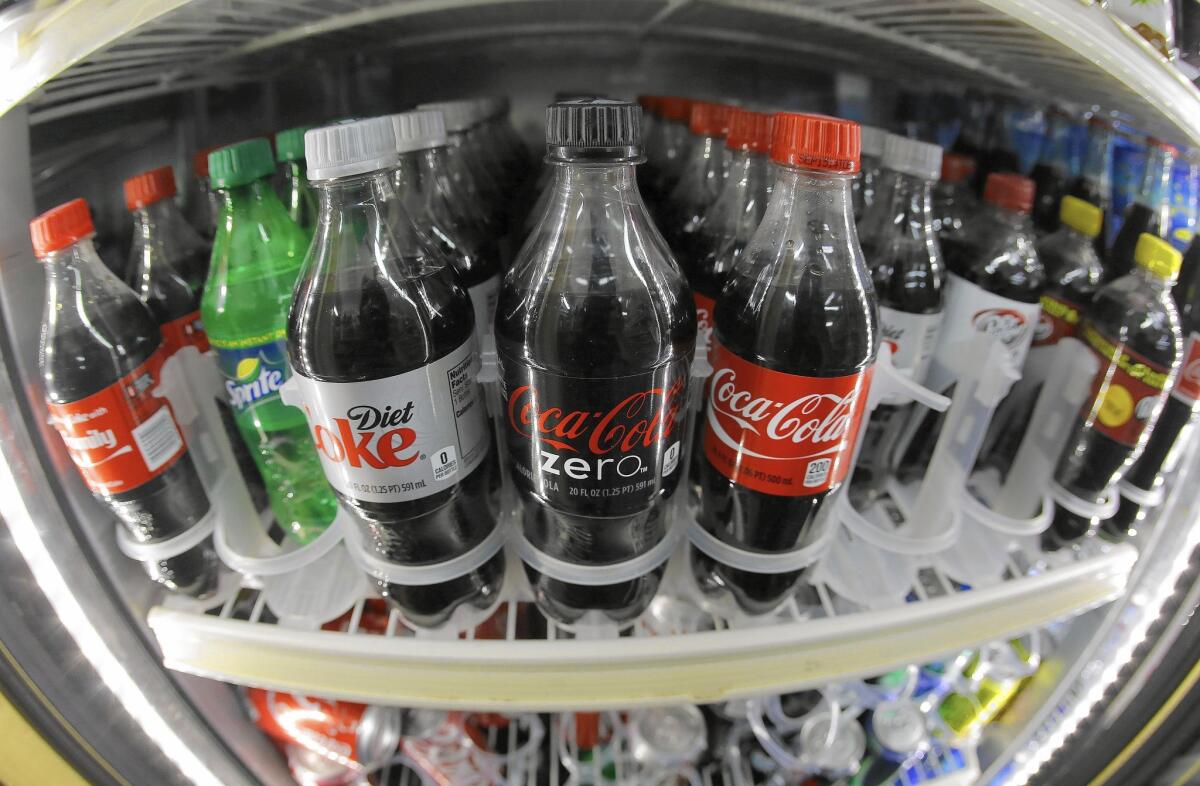Local measures against sugary-drink tax, fracking raise millions

- Share via
Industry groups are pouring millions of dollars into defeating local ballot measures in California that would levy taxes on sugary drinks in San Francisco and Berkeley, and outlaw the oil-extraction method known as fracking in Santa Barbara and San Benito counties.
Voters will be asked to weigh in Tuesday on a spectrum of issues that reflect the concerns of Californians in cities and counties large and small, including GMO-produced foods in Humboldt County and dueling marijuana-growing measures in Lake County.
But for sheer expense, the soda tax and anti-fracking proposals are getting the most attention.
The American Beverage Assn. has spent $9.1 million to fight San Francisco’s Proposition E — which would impose a 2-cent-an-ounce tax on sodas and other sugar-sweetened drinks — and $2.4 million to defeat Berkeley’s proposed 1-cent-an-ounce tax.
Roger Salazar, a spokesman for the No on E campaign, also known as the Coalition for an Affordable City, said the large sums are partly a reflection of the Bay Area’s expensive media market, but also the beverage industry’s commitment to fighting special taxes on its products.
“It’s hard enough to do business in San Francisco as it is,” Salazar said. “The cost of living is extraordinarily high. Another tax burden on a common grocery item is not the right approach. Sure, people ought to be more aware and educated about healthy lifestyle choices, but a regressive tax that disproportionately affects lower-income individuals is not the way to do it.”
Scott Wiener, one of four supervisors who proposed Proposition E because of the negative health effects of sugared-beverage consumption, said he knew going in that the stakes would be high but derided the opposition for attempting to capitalize on the anxieties of San Francisco’s rising cost of living.
“We knew there was a chance that they’d spend at this corporate tidal wave level,” Weiner said. “But it’s very cynical of them to try to buy their way into the very real anxiety we have right now in San Francisco as far as the cost of housing.”
Supporters of Proposition E have raised about $250,000 and are relying heavily on door-to-door canvassing to get their message out, Weiner said. A two-thirds vote is required for the measure to pass.
Money is also at the center of the proposed fracking bans. A coalition of energy companies has raised $7.7 million to defeat Measure P in Santa Barbara County and Measure J in rural San Benito County, on the southern edge of Silicon Valley.
Most of the money raised by the Californians for Energy Independence political action committee has been funneled to more populated Santa Barbara County, where the oil industry has a long history. Energy companies say the proposals would seriously impair, if not shut down, oil production in those areas.
Both measures would prohibit high-intensity petroleum operations, including hydraulic fracturing, that supporters say could trigger earthquakes, pollute the aquifer and deplete groundwater supplies during droughts.
Eric Smith, a political science professor at UC Santa Barbara, said if any of these measures is approved, it could have a domino effect in other communities, hence the sizable expenditures.
“They’re afraid if one initiative wins, it will spawn two more and that will spawn 10 more and so on,” said Smith, who supports Measure P in Santa Barbara County.
In a related proposal that has drawn little attention or money, Mendocino County’s Measure S would establish the “rights to natural and chemical-free communities and ecosystems … without manipulation and overwhelming influence from corporations.”
Fracking and related industrial activities would be banned if the measure is approved, said Peter Scott Norris of the Community Rights Network of Mendocino County, which placed the issue on the ballot.
Humboldt County voters will be asked to ban the production of genetically modified crops. The intention is to protect organic farmers and to allow the region to market itself as a GMO-free zone, said Bill Schaser, spokesman for the Yes on Measure P campaign.
“There’s a lot of concern in our community about cross-contamination,” Schaser said. “We’re an agricultural area. It’s very much an economic issue, and niche markets are going strong.”
A human rights component is contained in one of two competing marijuana cultivation measures in Lake County. Measure P seeks to allow residents to exercise a “human right to gardening,” including the cultivation of cannabis, and seeks to ease restrictions in current laws.
Measure O, or the Medical Marijuana Control Act Initiative, would repeal current county laws regarding cannabis cultivation and would establish new regulations. It would impose a $50-a-plant fee on collectives and individuals who cultivate marijuana, and the money generated would pay for enforcement.
If both measures receive more than 50% approval, the one with the most “yes” votes will win, said Lake County Registrar of Voters Diane Fridley.
The city of Weed, in Siskiyou County, has two advisory marijuana measures on its ballot, asking voters whether they would support more medical marijuana dispensaries and collectives in the city (Measure L) and a citywide ban on outdoor medical marijuana cultivation (Measure K).
Marijuana-related initiatives also will appear on the ballots in the cities of Encinitas, Santa Ana and Napa.
amanda.covarrubias@latimes.com
Twitter: @amcovarrubias
More to Read
Sign up for Essential California
The most important California stories and recommendations in your inbox every morning.
You may occasionally receive promotional content from the Los Angeles Times.














